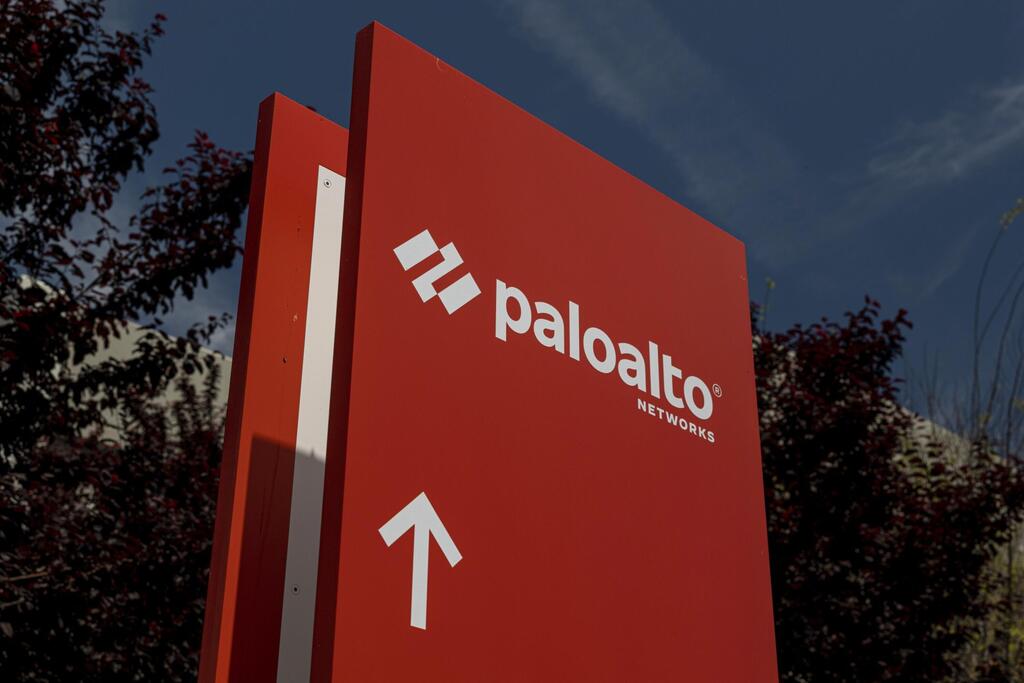
Palo Alto Networks loses over $30 billion in market cap, sends shockwaves throughout cyber market
The cybersecurity giant’s biggest one-day share drop came after the company said that softer client spending and steep promotions forced it to cut its annual billings forecast and that it plans to offer up to six months of free services to customers who are switching to its one-stop-shop platform
Losing over a quarter of your market cap is always a painful event, but when the fall shaves off more than $30 billion, as was the case on Wednesday with Palo Alto Networks, it's an especially significant blow.
In fact, Palo Alto’s biggest one-day share drop, which came after the company said that softer client spending and steep promotions forced it to cut its annual billings forecast, saw it lose more than the entire value of Check Point
2 View gallery


Palo Alto Networks CEO Nikesh Arora and Founder Nir Zuk.
(Photo: Yuval Chen, Ryan Purvis)
For Palo Alto, which in the last year has become the undisputed king of the cyber market, with the highest value among the players operating in it, disappointing news is a rare occurrence.
The trigger for the fall was provided by a forecast for annual revenues of $7.95-8 billion, contrasting with a previous forecast of $8.15-8.2 billion. This still represents an annual growth rate of 15%. A similar growth rate is also expected at the quarterly level, which will bring Palo Alto to revenues of approximately $1.96 billion in the current quarter. But the weak forecast is only a symptom, and the actual issue runs deeper. If Palo Alto is indeed as strong as perceived, perhaps it will ultimately profit from this situation, but the competitors in the cyber market should also be concerned, especially startup companies that are based on a single product.
“One of the hardest things to do is to change a strategy that is working,” Palo Alto Networks CEO Nikesh Arora said during the analysts call, before adding that “we firmly believe as a management team that the changes we're making today are going to give us better prospects in the mid-to-long term and allow us to drive this consolidation much faster.”
But judging by the stock's behavior during trading today, it is not certain that the market was convinced. Or at least, it didn't think that the direction indicated by Palo Alto— which would require it to invest heavily in marketing and sales, and would probably also harm profitability and revenues temporarily—justifies a phenomenal company valuation of $115 billion, which it held entering Wednesday. Moreover, there were those who expressed concern that Palo Alto was actually starting a price war, which would lead to a general drop in prices in the cyber market and harm all companies.
Palo Alto's new strategy includes an aggressive marketing approach based on a sort of "trade-in" transaction. This will allow organizations to “trade-in” old security systems from various suppliers in the cyber market that are still under contract and to switch to Palo Alto's product packages free of charge for the first six months.
The presentation of the new strategy sharpened the feeling that Palo Alto was experiencing its Microsoft moment, and not in a positive context. Just as Microsoft steamrolled many competitors when it pushed free products through its operating system, Palo Alto now seems like it intends to do the same.
As evidence, at the beginning of today's trading, the likes of SentinelOne, Check Point, Crowdstrike and Zscaler all suffered significant drops in their share price.
In the conference rooms of the cyber startups, most of them Israeli, they must have been sweating yesterday in the face of Palo Alto's new statements about "platform consolidation" and "customer fatigue."
Palo Alto highlighted an idea that was already thrown into the air last summer, when together with the annual reports, it published a detailed presentation with a vision for the cyber market. There the company talked about the "fatigue" of cyber managers in organizations, in light of the fact that the average organization has 75 different cyber solutions, which sometimes collide and interfere with each other.
Palo Alto, led by Israeli founder Nir Zuk, has always believed in the platform approach. This, in contrast to focusing on a limited number of products, which Gil Shwed of Check Point believes in.
"This fatigue is a relatively new phenomenon, and it is felt despite the high demand for security solutions," Arora said. To solve the problem of fatigue for system administrators in organizations, Palo Alto packages all products into three central platforms: Cloud, SASE, and Cortex. Some of the products are already being provided by the company free of charge. Last summer, it was announced in the U.S. that it was also offering firewall solutions free of charge. Since purchasing the Israeli company Talon for more than half a billion dollars a few months ago, it has been distributing its secure browser solution free of charge to customers of the SASE platform (secure access service edge).
Palo Alto now announced that it will continue to distribute Talon's software for free for the next 12 months, which threatens Dan Amiga's Israeli competitor Island.
"The demand is strong because the attacks are also becoming more sophisticated. I personally receive calls from CEOs and board members who have had bad cyber events. In the last quarter, we offered 1,500 of our largest customers free support services during a cyber incident," said Arora.
While Palo Alto can afford to give away certain products and services, Arora points out that it was the competitors who tried to raise prices, without success.
"We believe that this is our moment to invest, precisely because the demand is not weakening, and we are on course to meet the goal we set to reach an annual revenue rate of $15 billion in 2030," declared Arora.
However, he admitted that the new strategy will have consequences for the company's financial performance. According to estimates provided today, in the next 12 to 18 months, a slowdown in the rate of growth will be felt until the new customers who go through the "platform consolidation" process (as the company calls the pushing of competitors out in favor of Palo Alto's free half-year) start paying. After that, Palo Alto estimates that the rate of growth will accelerate, among other things due to the introduction of new products, which will be based more on artificial intelligence.
Palo Alto's new strategy, if implemented aggressively, as it appears, could create a significant shock in the cyber market. It will push for the joining of forces between players who will try to build opposing platforms, push the prices down, and in the end, may also harm the quality of the products that are supposed to protect everyone's information from cyber attacks. Beyond that, it also has implications on the ecosystem of cyber startups in Israel, for many of whom selling to Palo Alto is the preferred exit strategy. Palo Alto has picked up many startups in recent years to build its platforms, and the question is whether under the new circumstances it will be able to afford the pace of acquisitions that have characterized it so far.














